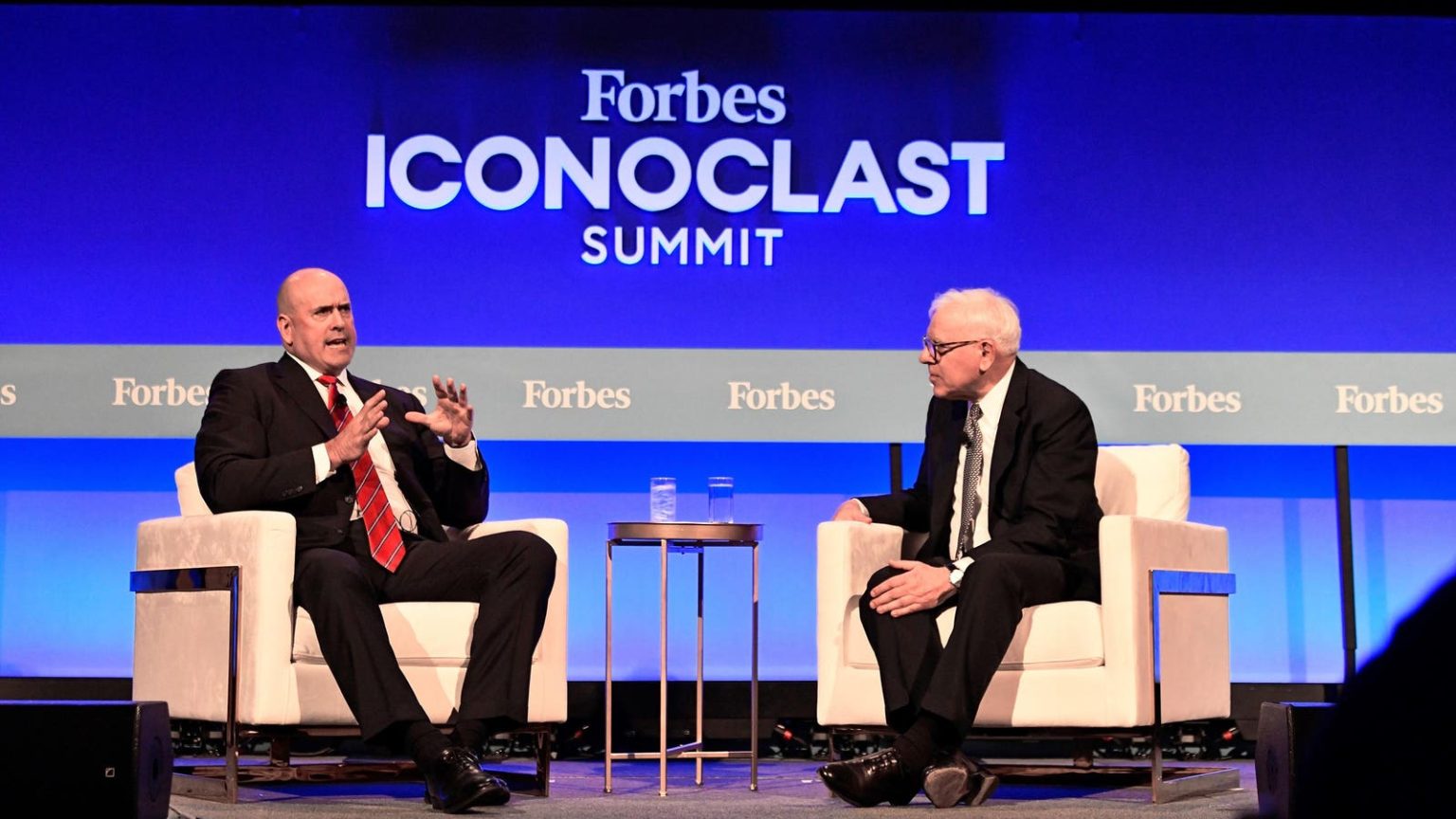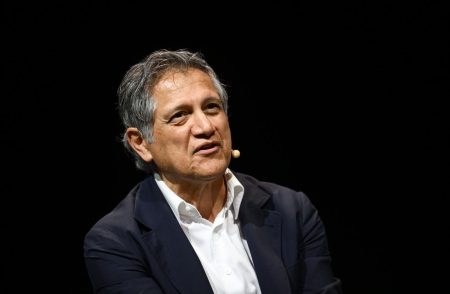It is a good time to be a money manager, with the S&P 500 index reaching a record high this week, but the rewards have not been evenly distributed. Gains have again been concentrated in a select few stocks like Nvidia, while some corners of the market, including small caps and Chinese stocks, are not up at all.
Dozens of investors and business leaders spoke at the third annual Forbes Iconoclast Summit on Thursday at Cipriani Wall Street about where they are seeing undervalued opportunities in public and private markets and what to beware of in the second half of the year. Panelists taking the stage include billionaires Todd Boehly, Jonathan Gray, Vinod Khosla and David Rubenstein.
Below is live coverage of the summit as we follow along in real time throughout the day. Join the conversation on social media using #ForbesIconoclast.
View from the Top
Billionaire Andreas Halvorsen, cofounder and CEO of $48 billion hedge fund Viking Global Investments, spoke about how he’s attracted enough young talent to run a successful firm for 25 years. “When you develop people from an early stage, they’re like sponges. They take in your methods, but they also seek advice, and we form these wonderful relationships between apprentices and very successful, proven investors,” Halvorsen said, adding that homegrown talent creates a cycle that sustains the firm when they grow to become veterans.
Halvorsen got his start before founding Viking in 1999 working for hedge fund pioneer Julian Robertson at Tiger Management. Robertson, who died at 90 years old in 2022, is well-known for mentoring several other billionaire hedge fund managers including Halvorsen, Dan Sundheim and Chase Coleman. “Julian Robertson had an extraordinary nose for sniffing out who had the potential to be a great investor,” Halvorsen said.
Halvorsen and Eric Wilmes, president and head of private equity in the Americas for GIC, Singapore’s $770 billion sovereign wealth fund, also discussed how the allocations to private markets in both of their portfolios has grown in the last decade, and Halvorsen cautioned that he feels the macro view on the economy may be unduly optimistic. “I find it somewhat curious that we seem to believe we’re in a benign economic environment. We’re talking about a soft landing at the same time as we’re very concerned about our geopolitical environment,” said Halvorsen. “To me, the two actually can’t coexist.”
Wilmes highlighted three themes of deglobalization, decarbonization and digitization where he’s focused on finding opportunity within disruption, and the two panelists also discussed how they’re viewing the influence of AI. “These things are expensive and there’s a lot of froth, but regardless the long-term opportunity here is going to be large.”
Geopolitical Opportunities And Risks
“We have two supercycles that are in their early innings: AI and the energy transition,” said Dambisa Moyo, an economist and member of the UK’s House of Lords. With the world getting more siloed, she added that “it’s very hard to bet against the United States.”
Moyo was joined on stage by Oscar Fahlgren, CIO of Mubadala Capital, and Mary Callahan Erdoes, CEO of JPMorgan Asset & Wealth Management. Fahlgren highlighted emerging market opportunities in India and particularly in Brazil, while calling developed market in Europe “sluggish.”
Erdoes concurred that investing in China is a difficult prospect but cautioned against being scared away entirely. “If you’re not afraid of the thing you’re investing in, it’s probably already been figured out,” she said. She cited where China is ahead of the U.S. on some aspects of their economy like electric vehicle adoption for public transportation and noted the city of Shenzhen’s bus fleet is now 100% electrified.
In what is likely to be a common theme throughout the day, the panelists also debated the influence of AI on global markets. “It’s the boring businesses that have started seeing the most impact from AI in our portfolio,” said Fahlgren. “AI will not displace humans. Humans that know how to use AI will displace humans that don’t.”
Leading A Private Equity Giant
Carlyle Group cofounder and co-chairman David Rubenstein interviewed the $425 billion (assets) firm’s current CEO Harvey Schwartz on stage together. Schwartz joined Carlyle last year after a long career rising up the ranks at Goldman Sachs as president and co-chief operating officer.
Schwartz said he views AI through three lenses: how to give portfolio companies a competitive advantage, how to make investment decisions better and faster, and how to run Carlyle. “There’s no doubt you’ll have a change in how work is accomplished,” said Schwartz. “I think it’s pretty good when 23 or 25-year-olds write their own memos, but we are seeing very specific ways in freeing up employees to be able to think more.”
Schwartz also discussed his upbringing in a working class family with parents who battled mental illness. He earned his undergraduate degree from Rutgers and worked as a bouncer at a nightclub while he was a student. Rubenstein asked him lightheartedly whether it was harder to kick people out of a nightclub or fire people as a boss, and Schwartz concluded naturally that being a bouncer was more dangerous.
The Midas Touch
Vinod Khosla, one of the world’s wealthiest and most respected venture capital investors, spoke with Forbes senior editor Alex Konrad about this year’s AI fervor. “We tend to overestimate the impact of technology in the short term and underestimate it in the long term. Imagine a world without the internet,” Khosla began. “Technology always surprises, and it’ll surprise again, probably at a larger scale than most people imagine.”
Most of the innovation in AI has come from the U.S. so far compared with rivals like China, and Khosla said he is optimistic but not complacent that the technology will be shepherded in good hands. “We should do everything we can to increase our pace of innovation and slow down the Chinese,” Khosla said, though he is in favor of some regulations and guardrails, pitting him against other prominent Silicon Valley voices. “I’m a techno-optimist, with reality and care for the people that get disrupted,” Khosla said. “Bringing everybody along is a good idea.”
The billionaire venture capitalist also spoke forcefully against the presidential campaign of Donald Trump, while a few of his peers in elite tech circles have been sympathetic to the former president. “Would you want your children to have the values that Trump has? Accused of rape, accused of lying, cheating?” Khosla asked the audience. “That’s a very simple test for me.”
Dealmaking for the Next Decade
Panelists at every stage of deal-making discussed the state of capital markets this year, with dealflow more tempered now than it was two or three years ago. Rohan Oza, managing partner of venture capital firm CAVU Consumer Partners, noted that founders had an easy time raising money when the market was overheated regardless of whether they had good business models. “Entrepreneurs got a little complacent,” Oza said. “Great companies are still getting funding, but a lot are not. Entrepreneurs have to have real ideas.”
M&A activity has slowed significantly since the start of 2023, and Michal Katz, head of investment banking at Mizuho Americas, said there is a lot of “pent-up demand” in the market now. Nasdaq President Nelson Griggs agreed that mergers are “highly concentrated in the top companies,” with activity more tepid for small or mid-sized private businesses.
In the meantime, startups and borrowers are hopeful that the Federal Reserve will begin cutting interest rates soon, even if the consensus is now that rate cuts won’t begin until 2025. “There is an expectation that interest rates have peaked,” Katz said. “You’re beginning to see that cycle of opening in the market already.”
The Democratization of Private Markets
Private market specialists Anne Valentine Andrews of Manulife Investment Management, Suyi Kim from CPP Investments and Keebeck Wealth Management’s Bruce Lee advised the audience on how to access this segment of investing. Andrews noted that the number of public companies in the U.S. has declined from 8,000 to 4,000 in the last 30 years, with more firms consolidating or being taken private. “If you want to get access to where alpha is being driven, you have to participate in the private markets,” Andrews said.
Kim noted that technology has helped private equity firms take more money from retail investors, while in the past the administrative burden of having too many small mouths to feed was prohibitive. With a larger supply of capital and more competition, she acknowledged that it can be harder to find fair valuations, but is still optimistic about the future for private equity’s performance. ”Private equity has very strong, motivated owners who are really motivated to make 2.5 to 3 times their money in five or six years,” Kim said. “They will find a way to make it work.”
Looking Beyond Access to Capital
Les Brun, chairman and CEO of Ariel Alternatives, explained the different type of private equity fund Ariel is building. Instead of looking primarily at access to capital, they’re buying minority-owned businesses or installing underrepresented management teams at their portfolio companies and helping them access big-ticket customers Ariel can connect them with. “There’s a large pool of talent within the large corporate American diaspora,” Brun said. “We’re looking for that talent in maybe different places than our peer firms.”
Tracy Britt Cool, cofounder of Kanbrick, joined Brun on the panel and also runs a community-focused firm that puts a different twist on private equity. Kanbrick is a partner for founders and mid-sized family-owned businesses that makes both majority and minority investments.
“It’s harder [than traditional private equity], but we’re building something that’s more differentiated,” says Cool, who worked for more than a decade at Berkshire Hathaway under Warren Buffett. “Our investors have realized that and they’ve been great partners after I think a lot of people initially are skeptical.”
Culture Capitalists
To wrap up the morning sessions, Ingeborg Investments managing partner Anna Mason, Serena Ventures general partner Beth Ferreira and Anjula Acharia, founder and CEO of A-Series Management & Investments, talked about ramping up investing in female founders and identifying the stars of the future.
Mason, who manages Olivia Walton’s family office, noted that men are often promoted and supported based on potential while women generally have to bring receipts proving their performance. “We’re looking for innovation that’s built with women in mind,” Mason said. “We’re investing in founders and business that are rewriting the conversation around stigma.”
While only a couple percentage points of total venture capital goes to female CEOs, the panelists were optimistic that statistic will only rise as women entrepreneurs get more exposure, even in a difficult environment for venture-backed businesses. “In every downturn, it seems like women and diverse founders and funders start to disappear,” Ferreira said. “There’s so much resilience now, so even if the numbers aren’t growing as fast as we want, they’re not going away.”
Disrupting Early-Stage Investing
A trio of venture capitalists continued wrestling with the ubiquitous question of AI to begin the afternoon session. “Even if it’s not a native AI startup, every startup essentially uses AI for some sort of efficiency,” said Nihal Mehta, general partner at Eniac Ventures.
But pure AI plays aren’t the only startups venture firms are considering, and they still have plenty of capital to put to use to invest in innovative founders in a multitude of industries. Latif Peracha, general partner of M13, said his firm is still bullish on crypto and blockchain companies and noted that its cycles tend to repeat themselves. “We believe despite the ups and downs and some of the polarization of that industry, there’s tremendous innovation.”
Shardul Shah, a partner at Index Ventures, singled out industries like cloud security and insurance as ripe for disruption for the unicorns of tomorrow. “Outside of AI, we’re seeing extreme competition from Israel to Seattle, Germany and France,” Shah said. “There is an enormous amount of capital available for the best companies in large categories.”
The three also discussed the most important qualities they can bring to the table for early-stage founders, and Mehta said the most important is conviction. “At the IPO party, that’s the one thing they’ll say is you were the first person that believed in me,” he said. “That business since that first pre-seed check has changed a dozen times, but that founder and that memory hasn’t changed.”
Investing With Impact
A quartet of panelists brainstormed how to drive change at scale and use resources from high-net-worth individuals for strong performance and a positive impact. “Philanthropy can address market failures, policy can do that as well, but you need investments to really drive innovation and unlock sustainable solutions,” said Erin Harkless Moore, managing director of investments at Melinda French Gates’ investing firm Pivotal Ventures.
Michael Anders, founder of hybrid family office Iconiq Capital which manages $80 billion, including the wealth of numerous tech founders and celebrities, said his firm sometimes pools together multiple clients to support causes and connects clients with experts that can vet opportunities. “What we’re trying to promote is this notion of trust-based philanthropy,” Anders said. “Because you created enormous wealth over here doesn’t necessarily mean you have the expertise to give it away.”
Bing Chen, CEO of the nonprofit Gold House which supports and unites the Asia Pacific community, and Igor Tulchinsky, founder and CEO of global quantitative investment firm WorldQuant, also talked about how they’re impacting the world most efficiently. “Many nonprofits are not well-run, and 90% of their annual income comes from a gala with a bunch of celebrities that don’t care about them,” Chen said. “We need to teach our philanthropic leaders to think more profitably about what their current sources of revenue are.”
Remastering the Universe
Jonathan Gray, the billionaire president and COO of trillion-dollar private equity giant Blackstone, joined Steve Forbes onstage to discuss where it can still grow around the globe. Gray noted that Blackstone has diversified beyond its typical private equity business into segments such as real estate, infrastructure and distressed credit. “We think we’re still in the early days of the expansion of alternatives, and that’s what gets us so excited, even though we have grown so much,” Gray said.
Gray rose through the ranks at Blackstone as its head of real estate, and he also did some reminiscing about how the firm has gotten to its market-leading position and described its $26 billion deal to take Hilton private in 2007. The timing right before the crash of 2008 initially made it look like a flop. “It should have been a career-shortening moment for me,” Gray said. But at its depths during the thick of the crisis, Gray described doubling down and pouring another $800 million into the business, and later after the hotel chain went public in 2013, Blackstone realized $14 billion in profit.
Blackstone has more than $400 billion now in its credit business, and Gray explained his view of why private credit has grown so much at his firm and all across the alternatives industry, taking market share for direct lending away from banks. “One of the challenges for banks is their business model involves being 12 to 14 times leveraged with a fundamental mismatch with short-term deposits and long-term assets,” he said. “First Republic failed not because there were problems in its loan book, it was because of the mismatched ratio. If we can help place those loans in long-term hands, it’s better for the system.”
Golden Globetrotters
Billionaire Todd Boehly and Jay Penske have teamed up to rebuild the Golden Globes after the international film and television awards were scarred by a corruption scandaL, but in a dramatic twist, the relationship of the two executives started with a cease-and-desist letter. “I had just bought the Hollywood Reporter because I lost my mind and thought I could get into this intellectual property business,” Boehly joked, and he tried to hire someone away from Penske to run it before he got the warning to stay away. But as time passed, “we got together and spent some time and realized we were more alike than different,” Boehly said.
Running a traditional media business isn’t easy, and Penske talked about the importance of diversified revenue streams from licensing, subscriptions, advertising and events. He cited Netflix’s announcement this week that it’s opening two “Netflix Houses” to give fans of its top shows immersive live experiences. “Even Netflix, with a strong core business, is trying to expand its portfolio to new revenue streams,” Penske said. “To future-proof, it’s all about making sure that when these big transformations happen, you have revenue from multiple sources.”
One of their success stories together is the Golden Globes, which garnered closed to 10 million viewers this year on CBS, 51% higher than last year. “The Golden Globes is larger than the Emmys, the SAG Awards and the Tonys combined,” Penske boasted. “Hopefully one day, we’ll be knocking on the door in terms of the size of the audience as the Oscars.”
Boehly has become a media and entertainment mogul, but the root of his fortune is in insurance. His cash cow is a Kansas-based life and annuities business called Security Benefit, and he’s never been more optimistic about its future. “The liabilities we have are pretty straightforward, they’re annuities. Over the next four years, there are going to be more people that turn 65 in the U.S. than any other period of time,” Boehly said. “At that stage, people don’t care as much about rates of return. They want to know how much cash is showing up every month.”
The Business of Sports
Sports are one of the hottest areas of the market for billionaires now, and Avenue Capital Group cofounder Sonia Gardner spoke about the new sports fund her private equity firm launched last year with advisors including famous athletes Michael Strahan and Lindsey Vonn, who joined her on stage.
While private equity has entered basketball and baseball, the NFL has kept its doors closed to institutional investors, but firms including Avenue are jockeying to be first in line for stakes in teams when the floodgates open, which may come soon. “The NBA was the first ones to kick it off, and the way it goes, the NBA is the first ones to kick it off—they handled gambling—and the NFL comes in and takes all the money,” said Strahan, an NFL Hall of Famer who played 15 years for the New York Giants.
But Avenue isn’t just focused on the NFL. Much of its fund is dedicated to emerging leagues, from women’s soccer to professional bull riding. “Women’s sports has incredible numbers across the board, not just in basketball,” said Vonn. Avenue counts Team USA soccer player Lauren Holiday among its advisors as well.
Sports valuations are growing so fast in part because the number of wealthy people interested in owning teams has grown so much faster than the number of available teams, but Avenue is looking worldwide for opportunities where there are still bargains. “There are so many different sports, and it’s just starting,” Gardner said. “We’re looking at NBA Africa, we’re looking at a soccer team in Portugal. What’s so interesting about this is it’s really truly global.”
MORE FROM FORBES
Read the full article here
















